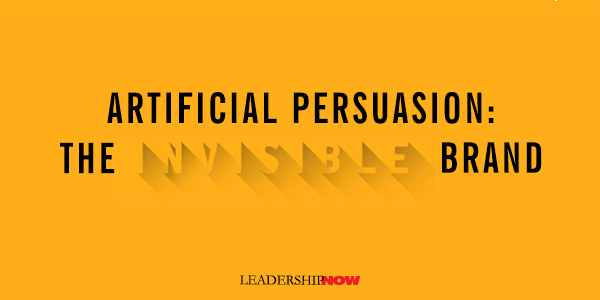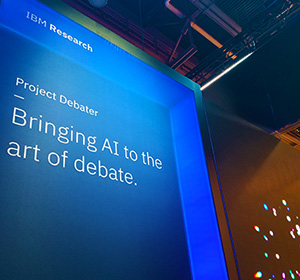 |
 |
09.02.19

Artificial Persuasion: The Invisible Brand
MASS MEDIA has been replaced by mass personalization through the rise of Artificial Intelligence. William Ammerman states in The Invisible Brand, “AI will play an increasingly important role in our lives in the years ahead as marketers turn vast amounts of computing power to the problem of influence people’s decisions.” Buried deep within the media we consume and the apps we use, unseen forces are working behind the scenes collecting data about us to pair with AI and digital advertising to influence everything we do. As a business, the challenge is how to best use this technology to promote ideas and products. As a consumer, the challenge is to understand how this technology is influencing us. Most of the time, it serves us well enhancing our lives and improving efficiency, and we welcome it. There are times when it feels like Big Brother is watching us. A better understanding of what is actually behind the technology will help us to ask better questions and respond in a measured and responsible manner. In a highly accessible way, Ammerman goes into great detail to explain how this technology is emerging and permanently altering the human-computer relationship. He identifies this emerging field as psychological technology, or simply psychotechnology. His focus is on marketing, but psychotechnology is working invisibly to reshape our behaviors in other areas of our lives. (Indeed, broadly speaking, everything we do is marketing.) Psychotechnology combines four areas of innovation: Personalization: Personalization is the norm in digital advertising. Machine learning connects all that data and allows marketers to tailor their messages just for you with your personality in mind. Persuasion: Marketers can use our innate human characteristics to influence our behaviors and thinking. Persuasion is not a new science, but today, it can be executed in new ways. “The science of persuasion is uncovering these unconscious reflexes that trigger specific behaviors.” Ammerman provides a fascinating look at how the science of persuasion is deployed behind the scenes in ways that influence our emotions and brain chemistry. Able to Learn: The amount and kind of information that is and can be gathered about our lives is astonishing. We don’t even think about it. Combined with AI, all this data gathering can be exploited through the power of machine learning. “Algorithms can learn by being fed data about what works and doesn’t work, and they can adapt in real-time to changing information.”  We can now have conversations with machines based on data about what we like, where we go, and who we know that is not unlike the conversations we would have with friends. Increasingly, people are creating emotional bonds with AI-powered machines. Our personal AI-powered tutor could help us to be continual lifelong learners—“a resource to help us learn the skills we need for our jobs, or even help us to identify the various flora and fauna we might spy on a mountain hike.” Ammerman raises questions regarding who owns our data, what is the government’s responsibility, should there be limits, and it’s use in political propaganda. For better or worse, the invisible brand is with us, and we have come to depend on it. “Behind all of this psychotechnology is an army of interests: corporations, governments, unions, politicians, religions, scientists, and universities, all vying for our hearts and minds. Through psychotechnology these brands operate invisibly, but collectively they are reshaping the market and the role of marketing.” Tim Berners-Lee remarked, “If you put a drop of love into Twitter, it seems to decay, but if you put in a drop of hatred, you feel it actually propagates much more strongly.” Perhaps we are hardwired to develop trust and connections slowly, being ever on the lookout for deceit and deception. A drop of love must be confirmed over and over across a long expanse of time to gain traction. We are slow to trust. Conversely, our instinct for survival has us on edge, always ready to respond aggressively to threats. A drop of hate triggers us more quickly, as we respond with less hesitation. This is an exploit the Invisible Brand can use against us by hacking our hate. To remain competitive, business must understand the forces shaping the marketplace. And consumers must educate themselves to the opportunities and dangers and develop the wisdom to think for themselves. Continue the discussion with these thought starters from William Ammerman: ▪ We’ve gone from delivering the same message to everyone at the same time through mass communications, to technology that can deliver different messages to every individual, on demand, through mass customization. 
Posted by Michael McKinney at 10:00 PM
|
BUILD YOUR KNOWLEDGE


How to Do Your Start-Up Right STRAIGHT TALK FOR START-UPS 
Grow Your Leadership Skills NEW AND UPCOMING LEADERSHIP BOOKS 
Leadership Minute BITE-SIZE CONCEPTS YOU CAN CHEW ON 
Classic Leadership Books BOOKS TO READ BEFORE YOU LEAD |